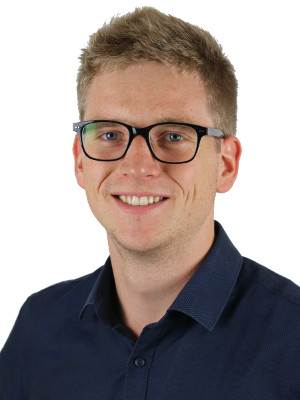Kategorie: ‘Information, Kommunikation und Elektronik’
Coffee, pizza and the elixir of the undead
A packed auditorium and lots of curious students: the first MINT Science Slam at RWTH Aachen University was a resounding success. Over 30 schools from the region brought their upper school classes to the MINT Science Slam to gain an entertaining insight into the diversity of MINT degree programmes.
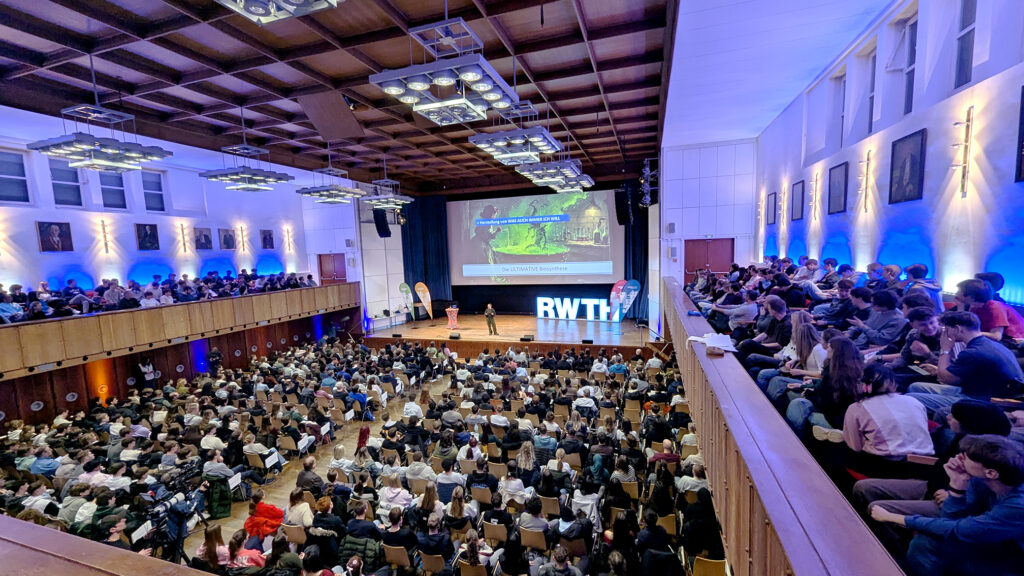
Daphne Heil und Melih Dal
The concept behind Science Slam is simple and effective: young scientists present their research topics in a clear, creative and enthusiastic manner in a maximum of ten minutes. The school pupils then evaluate the presentations themselves. This provides a lively insight into the diversity of STEM subjects, from mechanical engineering and biotechnology to medicine and electrical engineering.
Felix Walger was also there. In his slam, ‘Tailor-made medicine (technology) for everyone’, he impressively demonstrated how engineering research enables concrete social and medical applications. His presentation highlighted the central role that electrical engineering plays in the development of modern, personalised medical technology, a topic that met with great interest among the school pupils.
Alongside Walger, other young researchers took to the stage, including Rosario Othen, who won the slam with his presentation on coffee, paper and science, as well as contributions on topics such as cancer research, biotechnology, mathematics and sustainable energy. Knowledge transfer met entertainment.
The MINT Science Slam was first held as a joint project between the RWTH Knowledge Hub and the Central Student Advisory Service at RWTH Aachen University. In his welcoming speech, Professor Joost-Pieter Katoen, Vice-Rector for Teaching at RWTH, emphasised the importance of STEM subjects as key technologies for understanding our world. The slam was entertainingly moderated by Elena and Martin Lichtenthaler, supported by the Campus Dance Crew, who added to the excitement.
The STEM Science Slam impressively demonstrated how important low-threshold, inspiring formats are for study orientation and how diverse, relevant and exciting STEM research at RWTH is. For the Faculty of Electrical Engineering and Information Technology, Felix Walger’s participation was a successful example of how research, teaching and the promotion of young talent can be effectively combined.
Beyond 5G: Bringing 6G to the Factory Floor
Starting in January 2026, the project “6GEM+: Value-oriented 6G Communication Systems for the Networked Digital Industry” has officially launched. Led by Professor Haris Gačanin, who holds the Chair for Distributed Signal Processing at our faculty, this initiative marks the transition from pure research to practical industrial transfer.
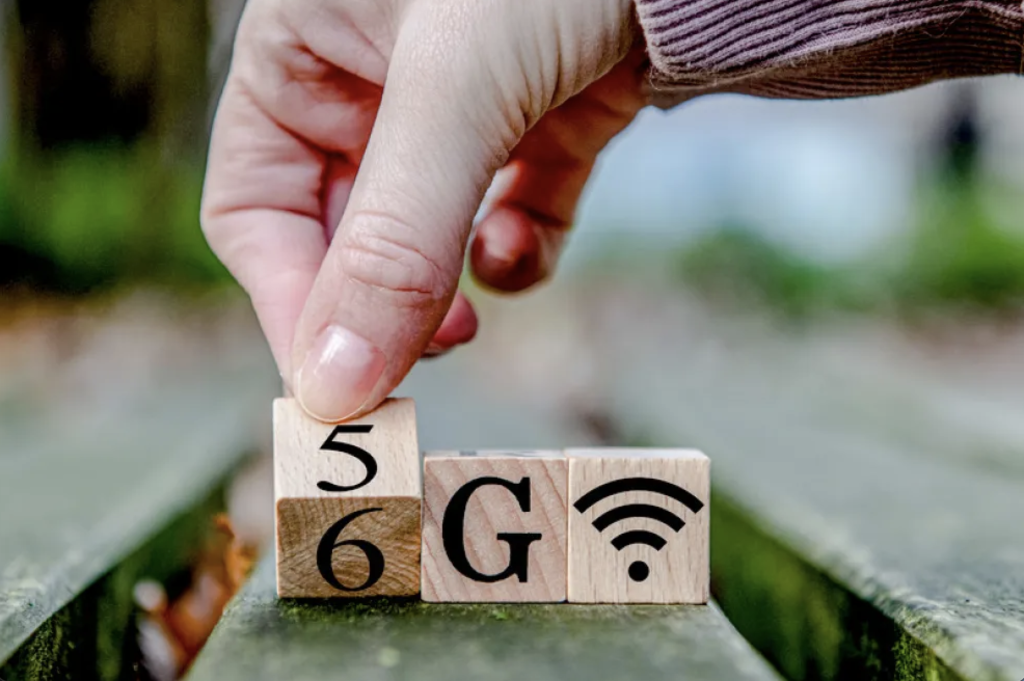
RUB, Marquard
While 5G laid the groundwork for mobile connectivity, it faces limitations in demanding industrial environments. Current systems often struggle with integrated AI computing, real-time data transmission, and the ultra-low latency required for advanced robotics. The 6GEM+ Transfer Hub is designed to overcome these barriers, ensuring that the next generation of networks can support fully autonomous logistics and AI-driven production.
Supported by 25 million euros in funding from the Federal Ministry of Research, Technology, and Space (BMFTR), the project will run for four years. It brings together a powerful consortium including TU Dortmund, Ruhr-Universität Bochum, and the Fraunhofer Institutes for Production Technology (IPT) and Material Flow and Logistics (IML). A key element of this project is the involvement of industrial “use-case mentors” who provide real-world insights to ensure that the developed technologies are not just innovative, but ready for the factory floor.
Prof. Max Lemme as co-author in Nature Photonics
The Faculty of Electrical Engineering and Information Technology congratulates Prof. Max Lemme on a special scientific achievement: as co-author, he contributed to a consensus statement publication in the renowned journal Nature Photonics. The publication is entitled ‘Guidelines for accurate evaluation of photodetectors based on emerging semiconductor technologies’ and provides important impetus for the international research community.
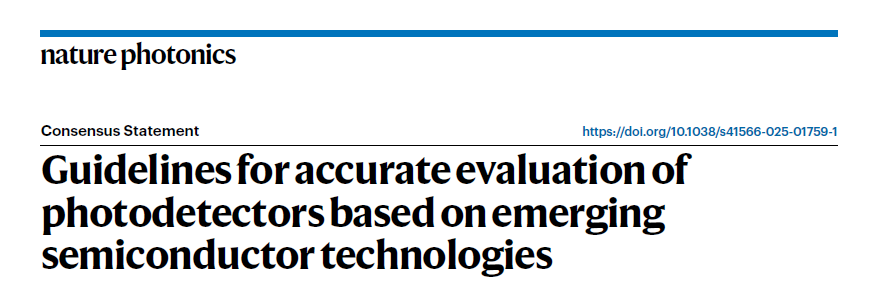
A consensus statement publication summarises the current state of knowledge in a specialist field and formulates recommendations, standards or procedures that promote reliable and uniform scientific practice. In this article, leading experts from research and industry have developed for the first time a comprehensive framework for the precise characterisation, documentation and comparability of photodetectors based on novel semiconductor materials.
There is a great need for such guidelines: photodetectors made from innovative material classes such as organic semiconductors, perovskites, quantum dots, two-dimensional materials, metal oxides and carbon nanotubes have made enormous progress in recent years. At the same time, inconsistent measurement methods and reporting standards have so far made it difficult to compare different studies and thus hindered scientific development in this field.
The recommendations that have now been published create a common foundation for the community and support transparent, reproducible and comparable research practices. This benefits not only academic working groups, but also industrial development processes and the emergence of future photonic technologies.
Prof. Max Lemme is not only the holder of the Chair of Electronic Components at our faculty, but also the managing director of AMO GmbH, whose research focuses are closely linked to the topics covered in the publication. The development and integration of novel materials for optoelectronic components is one of the company’s core activities. Participation in this international consensus paper underscores the great scientific and technological relevance of this work.
AMO GmbH has also highlighted the publication in its own article. Further information can be found on the website and on LinkedIn.
Four RWTH researchers admitted to the German Academy of Engineering Sciences
The German Academy of Science and Engineering, acatech for short, has accepted four scientists from RWTH Aachen University as new members: Fabian Kießling, Max Lemme, Constantin Häfner and Walter Leitner.
acatech is the central voice of technical sciences in Germany and is funded by the federal and state governments as a national academy. It advises politicians and society independently, factually and in the public interest on issues relating to shaping the future of technology. Its members come from the fields of engineering and natural sciences, medicine, and the humanities and social sciences. The patron of the academy is the Federal President.
With the admission of the four new members, a total of 35 scientists from RWTH Aachen University are now part of acatech. In addition to Professor Max Lemme, Professor Rainer Waser, Professor Dirk Uwe Sauer, Professor Jürgen Roßmann, Professor Rik W. de Doncker and Professor Steffen Leonhardt from the Faculty of Electrical Engineering and Information Technology are also members of the academy.
Max Lemme: Research into the electronics of the future
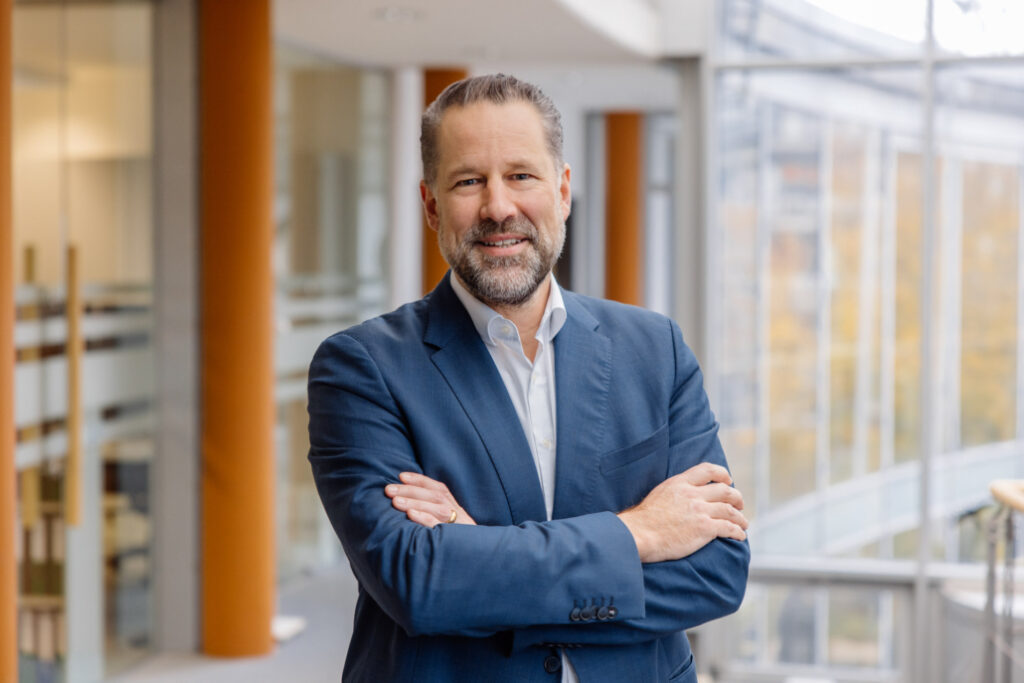
© Martin Braun
Professor Max Lemme holds the Chair of Electronic Components at RWTH Aachen University and is managing director of AMO GmbH. His research focuses on novel electronic and optoelectronic components based on two-dimensional materials such as graphene. The aim is to integrate these materials into future micro- and nanoelectronics, sensor technology and neuromorphic computing systems. Lemme is also spokesperson for the NeuroSys future cluster.
In addition to him, three other outstanding researchers from RWTH Aachen University were accepted into acatech: Professor Fabian Kießling, Director of the Helmholtz Institute for Biomedical Engineering and pioneer of molecular imaging, Professor Constantin Häfner, Director of Research and Transfer at the Fraunhofer Society and expert in high-power lasers, and Professor Walter Leitner, Chair of Technical Chemistry and Petrochemistry and Director at the Max Planck Institute for Chemical Energy Conversion.
Their admission recognises their scientific achievements and their contribution to the further development of technical sciences in Germany.
The Science of Sound and Well-Being – Inside RWTH’s MOSAIC Project
Traffic noise, birdsong, or the hum of a computer – sounds are part of everyday life. But when do they start to affect our well-being?
That’s the question behind MOSAIC (Acoustic Well-Being in a Multi-Domain and Contextual Spatial Approach), a new graduate research group coordinated by RWTH Aachen University.
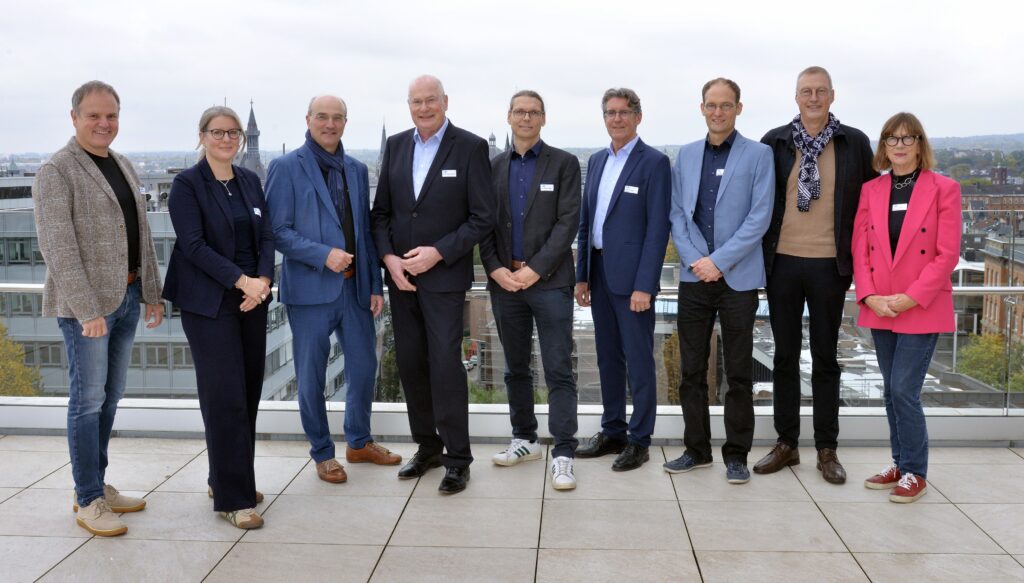
Foto: Andreas Schmitter
A key partner is the Institute of Hearing Technology and Acoustics (IHTA), led by Prof. Janina Fels, where engineers explore how sound and human perception interact.
Together with Prof. Marcel Schweiker from the Chair of Healthy Living Spaces, she investigates how acoustic comfort can be measured and improved.
As Prof. Schweiker notes: “Construction noise is usually perceived as more disturbing than birdsong – but at a certain level, even birdsong becomes tiring.”
Beyond volume, the team looks at how light, temperature, and room geometry influence how we experience sound – using methods and instruments deeply rooted in electrical engineering.
At the Kick-off Meeting on October 15, researchers and representatives of the HEAD Genuit Foundation gathered to launch the four-year program.
Foundation founder Prof. Klaus Genuit, a graduate of RWTH’s electrical engineering program and an honorary professor at the university, emphasized the importance of supporting young researchers in acoustic science.
“In a football stadium, I expect a certain level of noise – I’d be surprised if it were quiet,” Schweiker added.
MOSAIC aims to capture exactly this context dependency through modern sensing and signal-analysis techniques – many of which stem from ETIT’s research tradition.
The future of battery technology: Revolution using AI
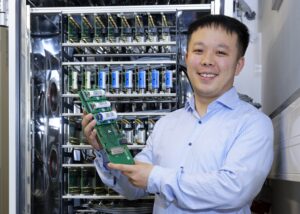
Prof. Weihan Li . © Peter Winandy
Innovative Battery Research at RWTH Aachen
Junior Professor Weihan Li is revolutionizing battery research at RWTH Aachen by developing AI-powered testing methods that enable precise predictions about the future performance and lifespan of battery cells already during the production phase.
Utilizing advanced technologies such as digital twins, data-driven models, and automated diagnostic procedures, his approach transforms traditional battery management into a proactive system—moving from mere observation to anticipatory strategies.
Shortened Development Processes and Sustainable Innovation
At the core of his research is the goal of significantly shortening development cycles, reducing production costs, and simultaneously enhancing sustainability throughout the entire battery lifecycle. Prof. Li succinctly states:
“Ultimately, we want to accelerate the development of high-quality, affordable batteries and make the entire battery life cycle more sustainable.”
The Synergy of Artificial Intelligence and Electrochemistry
Early on, Li recognized that the combination of artificial intelligence and electrochemistry is the key to the future of the battery industry. This insight drives him to push forward innovative solutions:
“That’s when I realized: this is the future,” he recalls. “Since then, I’ve been working on integrating AI and electrochemistry.”
RWTH Aachen as an Innovation Engine
For Prof. Li, RWTH Aachen is more than just a research location—it provides an inspiring environment that nurtures young talent through strong networks and a pronounced spirit of innovation. The close collaboration with industry not only underscores the demand for modern battery solutions but also secures a significant share of funding.
Data-Driven Modeling as a Key Component
The extensive data base provided by the RWTH infrastructure is a central pillar in precise AI modeling. This essential resource not only guarantees research success but also forms the foundation for highly advanced analytical methods:
“This massive dataset is essential for building our AI models.”
Proactive Battery Management
Finally, Li’s approach aims not only to monitor the aging process of battery cells but to intervene proactively—well before they reach their maximum performance limits. In his own words:
“We don’t just want to understand how batteries age – we want to intervene before aging even begins.”
The advanced, AI-enabled methods of Prof. Li at RWTH Aachen pave the way for faster, cost-effective, and sustainable battery solutions. This groundbreaking work sets a new standard in battery development and reinforces Europe’s leading role in the energy transition.
Klee Prize 2025: Controllable exoskeletons – Support instead of replacement
Dr.-Ing. Lukas Bergmann impresses with his award-winning doctoral thesis, in which he developed an active exoskeleton and a cooperative controller to support movement intentions in real time.
Worldwide, strokes result in mobility problems, and traditional treatments are frequently resource-intensive. Robotic rehabilitation systems can provide support when patients initiate movements independently. Dr. Lukas Bergmann explains:
„In the long term, research into exoskeletons can make a significant contribution to supporting people with musculoskeletal disorders. The exciting thing for me is that control technology has a very practical application here.“
It describes an active exoskeleton that enables safe coupling between humans and devices, as well as a cooperative controller that supports joint torques in real time.
It is also worth mentioning that Dr.-Ing. Sonja Ehreiser (mediTEC, RWTH Aachen University) won first place in the Klee Prize 2025 for her dissertation on improving the care of patients with knee prostheses.
The VDE, a leading technology organization in Europe, has been promoting innovation and technological progress for over 130 years. With the Klee Prize 2025, the VDE honors outstanding research work that offers great benefits for patients and shapes the future of medical technology.
The VDE (VDE Association for Electrical, Electronic & Information Technologies) is based in Frankfurt am Main. More information at VDE Website
Source: VDE Press Release
Funded internship in Tokyo

The Chair of Distributed Signal Processing at RWTH Aachen University, in cooperation with its Japanese partner, is offering a fully funded internship for students demonstrating exceptional potential in the area of networking and wireless communications. The programme is aimed at both Bachelor and Master of Science students.
As Japan’s only national research institute specialising in the field of information and communication technology, NICT maintains the Beyond 5G R&D Promotion Unit, which collaborates with the Chair of Distributed Signal Processing on joint research projects. The aim of the scientific work is to design and evaluate next-generation wireless networks, taking into account cutting-edge information and communication technology and other technology areas.
An internship at the National Institute of Information and Communications Technology (NICT) involves the study of Beyond 5G use cases, with the verification of relevant communication functions and interfaces being a key element of this. One use case that proves relevant in this context is, for example, the integration of radio resource management and optimised energy management. In addition to this, contributions to the development of Beyond 5G Proof-of-Concept are to be expected, based on the defined use cases. This will be developed in cooperation with the testbed facilities of the Chair of Distributed Signal Processing. Interns will participate in regular meetings and discussions with the NICT team during their internship work, where they will receive guidance. At the end of the internship period, students are required to summarise the results and prepare a report.
The internship is based on the Beyond 5G/6G White Paper and aims to establish a long-term international research cooperation between NICT and the Chair of Distributed Signal Processing. The interns will spend four to six months in Tokyo. The financial costs associated with the stay, including travel, accommodation, overseas travel insurance and a daily allowance, are covered by the offer.
In order to participate, it is necessary to have a general knowledge of programming with pseudo-code, as well as excellent written and oral English skills and an excellent knowledge of fundamental principles in communications. Furthermore, the following Bachelor of Science or Master of Science courses must have been completed with a grade of at least 2.0:
For Bachelor of Science students: Fundamentals of Computer Science 4 – Introduction to Machine Learning Methods.
For Master of Science students: Signal Processing for Mobile Communications, Signal Processing in Multi-Antenna (MIMO) Communication System, Estimation and Detection Theory.
Applications must be submitted three months before the planned start of the internship. They can be sent throughout the year to Professor Haris Gacanin at the following e-mail address: harisg@dsp.rwth-aachen.de. Further information can also be requested at the above e-mail address.
Neuromorphic Hardware: Kick-off event in January
The NeuroSys future cluster at RWTH enters its second phase
At the beginning of this year, the Cluster4Future NeuroSys (Neuromorphic Hardware for Autonomous Artificial Intelligence Systems) is entering its second phase.
The Clusters4Future initiative is part of the German government’s High-Tech Strategy 2025 and is funded by the Federal Ministry of Education and Research.
At the kick-off event at the end of January, more than 90 participants discussed their ideas and technologies for the development of neuromorphic hardware in the Super C at RWTH Aachen University.
Neuromorphic systems are modelled on the basic building blocks of the brain, neurons and synapses. Neuromorphic hardware is a resource-saving but powerful basis for energy-intensive artificial intelligence research operations. The aim is to create a technology basis for neuromorphic components and alogrithms, building on the basic research carried out at RWTH Aachen University and the Jülich Research Centre. The coordinator of the future cluster is Professor Max Lemme, Head of the Chair of Electronic Components at RWTH Aachen University.
Learning neuromorphic AI chips could soon enable energy-efficient on-site data processing and thus offer promising prospects for future working methods, smart city concepts and the Internet of Things. Various contributions from autonomous driving to learning systems and personalised medicine will also be delivered.
The second phase of the project is planned for three years and will see RWTH collaborating with a wide range of experts from research and industry.
Further information on the project can be found here



